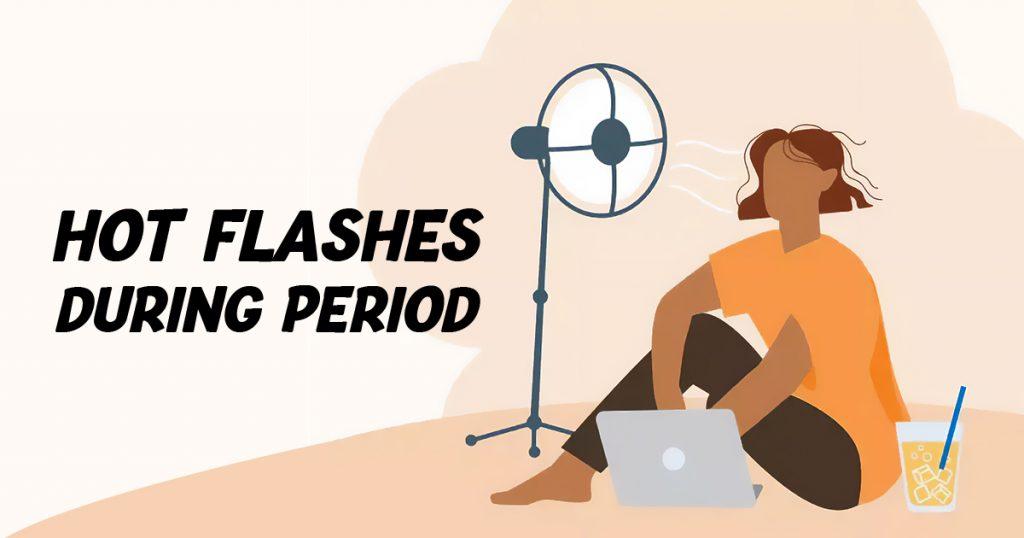A hot flash is when your body suddenly feels really hot for a short time. Hot flashes can happen because of changes in hormones during your period or for other reasons. During a hot flash, you might feel heat on your face, neck, and upper body. It can last a few seconds or several minutes.
Other symptoms you might feel during a hot flash include:
- Your skin turning red
- Your heart beating faster
- Sweating a lot
- Feeling cold after the hot flash ends
Many people think hot flashes only happen during menopause, but you can start feeling hot even during your period. Usually, hot flashes aren’t a big problem unless they come with other symptoms. Sometimes they might mean there’s a health issue, but often they’re nothing to worry about.
If you want to know more about hot flashes during your period, like why they happen or how to deal with them, keep reading or talk to your doctor.
Why do hot flashes happen?
Hot flashes often happen when the hormones in your body change. For instance, during menopause, estrogen and progesterone levels drop, leading to hot flashes. These hormonal shifts also occur during your menstrual cycle, causing symptoms like PMS, including hot flashes for some people.
After ovulation, which is around the 14th day of your cycle, progesterone levels rise. This might cause a slight increase in body temperature, though you might not feel it. As progesterone rises and estrogen falls, it can affect how your brain regulates body temperature. Your brain might become more sensitive to small changes in temperature, leading to signals that make you sweat, even when you don’t need to cool off.
Is it early menopause?
Some people might have hot flashes or may sweat so much during their period as a normal part of the menstrual cycle, but for others, they could mean something else, like early menopause, also called primary ovarian insufficiency (POI).
POI can bring menopause symptoms earlier than usual, sometimes even before your mid-40s or 50s, when menopause usually happens. Even though it’s called “ovarian insufficiency,” sometimes ovaries can still work, but not predictably.
Symptoms of POI may include:
- Periods becoming infrequent and irregular
- Hot flashes or night sweats
- Mood swings
- Trouble focusing
- Less interest in sex
- Pain or dryness during sex
POI not only raises the chances of heart disease and bone fractures but often leads to infertility too. If you have symptoms of POI and want to have children, talk to your doctor as soon as possible. Treating POI might improve your chances of getting pregnant later on.
Other Causes of Hot Flashes During Your Period
Sometimes, hot flashes during your period might not be because of menopause. They could point to other health issues or side effects of medication.
Some other reasons for hot flashes include:
- Infections, ranging from mild to serious ones like tuberculosis.
- Thyroid problems like hyperthyroidism or hypothyroidism.
- Conditions like HIV or low testosterone.
- Drinking too much alcohol.
- Tumors in certain parts of the brain.
- Cancer and its treatments.
Also, feeling anxious or stressed can make you experience symptoms similar to hot flashes. Certain medications can cause them too, like nifedipine, nitroglycerin, niacin, vancomycin, and calcitonin.
When should you see a doctor?
If you only get hot flashes right before or during your period, and you don’t have any other strange symptoms, it’s probably not a big worry. For some people, hot flashes during their period can be a usual PMS symptom or a sign of getting closer to menopause. But sometimes, they could mean there’s another health issue.
If you often have hot flashes during your period, especially if you’re in your 20s or early 30s, it’s a good idea to see your doctor. Because sometimes, it can signal a serious issue. Tell your doctor if you have regular hot flashes along with:
- Changes in appetite
- Trouble sleeping
- Fever
- Losing weight without reason
- Unexplained rash
- Swollen glands
If hot flashes affect your mood or make you feel anxious or stressed, talking to a therapist might help too.
How to Effectively Manage Hot Flashes
Hot flashes can be bothersome, but there are ways to ease them:
- Watch what you eat. Avoid caffeine, alcohol, spicy foods, aged cheese, and chocolate, as they can trigger hot flashes.
- Quit smoking. Smoking can make hot flashes worse.
- Relax. Try deep breathing, yoga, or meditation to help manage stress, which may make hot flashes easier to handle.
- Stay hydrated. Keep cool water handy to sip when you feel a hot flash coming on.
- Exercise regularly. Physical activity can help reduce the frequency of hot flashes.
- Consider acupuncture. It might help with hot flashes for some people.
- Try soy. Eating soy may help reduce hot flashes, but more research is needed.
- Dress in layers. Wear breathable fabrics and keep your environment cool with fans and open windows.
- Keep cool. Chill a towel in the fridge to use on your face or neck during a hot flash.
- Talk to your doctor. Hormone replacement therapy or low-dose antidepressants could help if hot flashes severely affect your daily life.
If hot flashes bother you a lot, speak with your doctor about treatment options.
Understand Hot Flashes During Your Period
To effectively manage hot flashes, it’s important to listen to your body and take action. If you experience frequent hot flashes during your period, especially if you’re in your 20s or 30s, consult your healthcare provider. Additionally, watch out for other unusual symptoms and seek medical advice if needed. Remember, there are various ways to alleviate hot flashes, from lifestyle changes to medical treatments. Don’t hesitate to explore these options to improve your quality of life.
